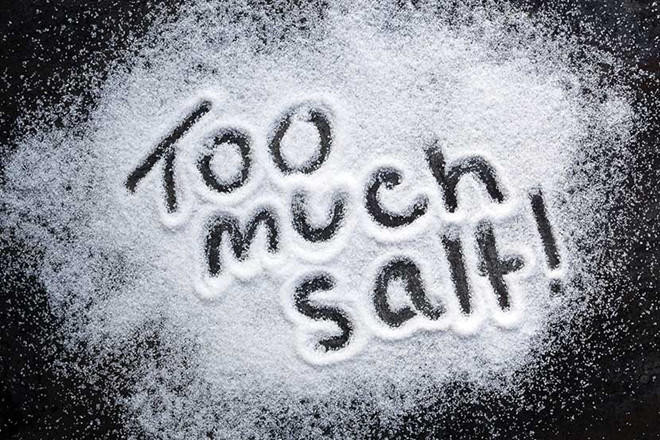3 Simple Ways to Detox Salt from Your Body
The minimum amount of sodium needed for normal body function is only about 0.5-1.25g, less than a teaspoon of salt. Currently, the average Vietnamese person eats 9.4g of salt per day, twice the recommended level of the World Health Organization. Therefore, to have a healthy body, you need to eat less salt or eliminate salt from the body.
 |
Here are three simple ways to help eliminate salt from your body:
Increase fruit and vegetable intake
Associate Professor Nguyen Thi Lam, former Deputy Director of the Institute of Nutrition, said that increasing the consumption of vegetables and fruits helps the body eliminate sodium. An adult should eat 400g of vegetables and 100-300g of ripe fruit a day. Vegetables and fruits not only provide vitamins and minerals but are also rich in fiber and antioxidants. People should choose green, yellow, and red vegetables and fruits rather than light-colored ones.
80g of ripe fruit is equivalent to a grapefruit segment, a sapodilla, a piece of watermelon, a small bunch of grapes...
Drink enough water
70% of the body is water, providing the perfect environment for cells to live peacefully without disease. An adult needs to drink 2-2.5 liters of water per day. Water should be distributed evenly throughout the day, do not wait until thirsty to drink because thirst means the cells are dehydrated.
Work up a sweat
Sweating is a great way to get rid of salt from your body, but it is important to stay hydrated while exercising. The World Health Organization recommends at least 150 minutes of moderate-intensity physical activity a week, or the equivalent. Children and adolescents should be physically active for at least 60 minutes a day.
According to Master Ngo Thi Ha Phuong, Institute of Nutrition, salt (NaCl) is made up of two chemical elements, sodium and chloride, has a salty taste, and is an essential spice in the daily meals of people around the world. Sodium is the main factor in creating the salty taste of salt and causes harmful effects to the human body if in excess.
Na+ is an electrolyte that plays a role in regulating osmotic pressure and fluid balance, acid-base balance, as well as electrophysiological activities in muscles and nerves. In addition, together with potassium and chloride, sodium is essential for the active transport of materials across cell membranes such as glucose metabolism and sodium ion exchange of cells.
Excess sodium compared to the recommended needs increases permeability, increases vascular tone, causes water retention in cells, increases peripheral resistance causing high blood pressure, and at the same time makes the kidneys have to work harder continuously. Increased sodium consumption is associated with high blood pressure, cardiovascular diseases, especially stroke and coronary heart disease.
According to Danviet
| RELATED NEWS |
|---|
